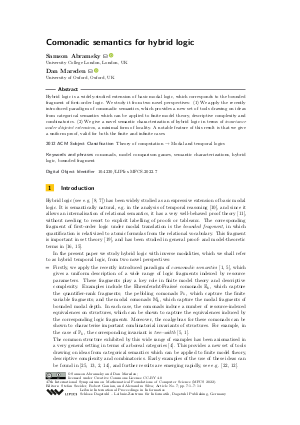Comonadic semantics for hybrid logic
Authors
Samson Abramsky  ,
Dan Marsden
,
Dan Marsden 
-
Part of:
Volume:
47th International Symposium on Mathematical Foundations of Computer Science (MFCS 2022)
Part of: Series: Leibniz International Proceedings in Informatics (LIPIcs)
Part of: Conference: Mathematical Foundations of Computer Science (MFCS) - License:
 Creative Commons Attribution 4.0 International license
Creative Commons Attribution 4.0 International license
- Publication Date: 2022-08-22
File

PDF
LIPIcs.MFCS.2022.7.pdf
- Filesize: 0.69 MB
- 14 pages
Document Identifiers
Subject Classification
ACM Subject Classification
- Theory of computation → Modal and temporal logics
Keywords
- comonads
- model comparison games
- semantic characterizations
- hybrid logic
- bounded fragment
Metrics
- Access Statistics
-
Total Accesses (updated on a weekly basis)
0Document
0Metadata
Abstract
Hybrid logic is a widely-studied extension of basic modal logic, which corresponds to the bounded fragment of first-order logic. We study it from two novel perspectives: (1) We apply the recently introduced paradigm of comonadic semantics, which provides a new set of tools drawing on ideas from categorical semantics which can be applied to finite model theory, descriptive complexity and combinatorics. (2) We give a novel semantic characterization of hybrid logic in terms of invariance under disjoint extensions, a minimal form of locality. A notable feature of this result is that we give a uniform proof, valid for both the finite and infinite cases.
Cite As Get BibTex
Samson Abramsky and Dan Marsden. Comonadic semantics for hybrid logic. In 47th International Symposium on Mathematical Foundations of Computer Science (MFCS 2022). Leibniz International Proceedings in Informatics (LIPIcs), Volume 241, pp. 7:1-7:14, Schloss Dagstuhl – Leibniz-Zentrum für Informatik (2022)
https://doi.org/10.4230/LIPIcs.MFCS.2022.7
BibTex
@InProceedings{abramsky_et_al:LIPIcs.MFCS.2022.7,
author = {Abramsky, Samson and Marsden, Dan},
title = {{Comonadic semantics for hybrid logic}},
booktitle = {47th International Symposium on Mathematical Foundations of Computer Science (MFCS 2022)},
pages = {7:1--7:14},
series = {Leibniz International Proceedings in Informatics (LIPIcs)},
ISBN = {978-3-95977-256-3},
ISSN = {1868-8969},
year = {2022},
volume = {241},
editor = {Szeider, Stefan and Ganian, Robert and Silva, Alexandra},
publisher = {Schloss Dagstuhl -- Leibniz-Zentrum f{\"u}r Informatik},
address = {Dagstuhl, Germany},
URL = {https://drops.dagstuhl.de/entities/document/10.4230/LIPIcs.MFCS.2022.7},
URN = {urn:nbn:de:0030-drops-168055},
doi = {10.4230/LIPIcs.MFCS.2022.7},
annote = {Keywords: comonads, model comparison games, semantic characterizations, hybrid logic, bounded fragment}
}
Author Details
References
-
Samson Abramsky, Anuj Dawar, and Pengming Wang. The pebbling comonad in finite model theory. In 2017 32nd Annual ACM/IEEE Symposium on Logic in Computer Science (LICS), pages 1-12. IEEE, IEEE, 2017.

-
Samson Abramsky and Dan Marsden. Comonadic semantics for guarded fragments. In 2021 36th Annual ACM/IEEE Symposium on Logic in Computer Science (LICS), pages 1-13. IEEE, IEEE, 2021.

-
Samson Abramsky and Luca Reggio. Aboreal categories: applications to preservation and invariance theorems, 2021. In preparation.

-
Samson Abramsky and Luca Reggio. Arboreal categories and resources. In 48th International Colloquium on Automata, Languages, and Programming (ICALP 2021), pages 115:1-115:20. Schloss Dagstuhl-Leibniz-Zentrum für Informatik, Schloss Dagstuhl - Leibniz-Zentrum für Informatik, 2021.

-
Samson Abramsky and Nihil Shah. Relating structure and power: Comonadic semantics for computational resources. Journal of Logic and Computation, 31(6):1390-1428, 2021.

-
Thorsten Altenkirch, James Chapman, and Tarmo Uustalu. Monads need not be endofunctors. In International Conference on Foundations of Software Science and Computational Structures, pages 297-311. Springer, 2010.

- Carlos Areces, Patrick Blackburn, and Maarten Marx. Hybrid logics: Characterization, interpolation and complexity. J. Symb. Log., 66(3):977-1010, 2001. URL: https://doi.org/10.2307/2695090.
-
Patrick Blackburn. Representation, reasoning, and relational structures: a hybrid logic manifesto. Logic Journal of the IGPL, 8(3):339-365, 2000.

-
Patrick Blackburn, Maarten De Rijke, and Yde Venema. Modal Logic, volume 53 of Cambridge Tracts in Theoretical Computer Science. Cambridge University Press, 2002.

-
Patrick Blackburn and Klaus Frovin Jørgensen. Reichenbach, Prior and hybrid tense logic. Synthese, 193(11):3677-3689, 2016.

-
Torben Braüner. Hybrid logic and its proof-theory, volume 37. Springer Science & Business Media, 2010.

-
Adam Ó Conghaile. Cohomological k-consistency, 2021. Technical Report.

- Adam Ó Conghaile and Anuj Dawar. Game comonads and generalised quantifiers. In Christel Baier and Jean Goubault-Larrecq, editors, 29th EACSL Annual Conference on Computer Science Logic (CSL 2021), pages 16:1-16:17, 2021. URL: http://arxiv.org/abs/2006.16039.
- Anuj Dawar, Tomáš Jakl, and Luca Reggio. Lovász-type theorems and game comonads. In 2021 36th Annual ACM/IEEE Symposium on Logic in Computer Science (LICS), pages 1-13, 2021. URL: https://doi.org/10.1109/LICS52264.2021.9470609.
-
Solomon Feferman. Persistent and invariant formulas for outer extensions. Compositio Mathematica, 20:29-52, 1968.

-
Solomon Feferman and Georg Kreisel. Persistent and invariant formulas relative to theories of higher order. Bulletin of the American Mathematical Society, 72(3):480-485, 1966.

-
Erich Grädel. Why are modal logics so robustly decidable? Bull. EATCS, 68:90-103, 1999.

- Phokion G. Kolaitis and Moshe Y. Vardi. On the expressive power of datalog: Tools and a case study. In Daniel J. Rosenkrantz and Yehoshua Sagiv, editors, Proceedings of the Ninth ACM SIGACT-SIGMOD-SIGART Symposium on Principles of Database Systems, April 2-4, 1990, Nashville, Tennessee, USA, pages 61-71. ACM Press, 1990. URL: https://doi.org/10.1145/298514.298542.
-
Azriel Lévy. A hierarchy of formulas in set theory. Number 57 in Memoirs of the American Mathematical Society. American Mathematical Soc., 1965.

-
Leonid Libkin. Elements of Finite Model Theory (Texts in Theoretical Computer Science. An EATCS Series). Springer, 2004.

-
Ernest G. Manes. Algebraic Theories, volume 26 of Graduate Texts in Mathematics. Springer Science & Business Media, 2012.

- Yoàv Montacute and Nihil Shah. The pebble-relation comonad in finite model theory. arXiv preprint, 2021. URL: http://arxiv.org/abs/2110.08196.
-
Jaroslav Nešetřil and Patrice Ossona De Mendez. Tree-depth, subgraph coloring and homomorphism bounds. European Journal of Combinatorics, 27(6):1022-1041, 2006.

-
Martin Otto. Elementary proof of the van Benthem-Rosen characterisation theorem. Technical Report 2342, Department of Mathematics, Technische Universität Darmstadt, 2004.

-
Tom Paine. A pebbling comonad for finite rank and variable logic, and an application to the equirank-variable homomorphism preservation theorem. Electronic Notes in Theoretical Computer Science, 352:191-209, 2020.

-
Eric Rosen. Modal logic over finite structures. Journal of Logic, Language and Information, 6(4):427-439, 1997.

-
Johan van Benthem. Modal logic and classical logic. Bibliopolis, 1983.

-
Moshe Y Vardi. Why is modal logic so robustly decidable? Technical Report TR-97-274, Rice University, 1997.

